-
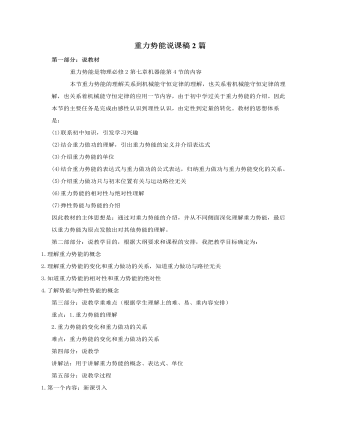
人教版新课标高中物理必修2重力势能说课稿2篇
(四)、弹性势能(据课时情况,可以让学生自学)生活中还有一些物体既没有运动也没有很大的高度却同样“储存”着能量,哪怕它只是孩童手里的玩具(图片:弹弓)。张紧的弓一撒手就会对箭支做功改变它的动能,松弛的弓有这样的本领吗?同样是弓前者具有能量而后者没有,那么什么情况下物体才具有这种能量呢?张紧的弓在恢复原状的过程会对外做功,但是拉断的弓还能有做功的本领吗?1.定义:物体由于发生弹性形变而具有的能量叫做弹性势能。2.弹性势能的大小与哪些因素有关呢?3、势能由相互作用的物体的相对位置决定的能量。重力势能:由地球和物体间相对位置决定。弹性势能:由发生形变的各部分的相对位置决定。(五).反馈练习1. 物体在运动过程中,克服重力做功50J, 则( )A.重力做功为50JB.物体的重力势能一定增加50JC.物体的重力势能一定减少50JD.重力做功为-50J
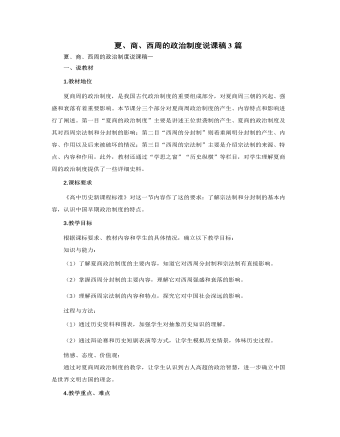
人教版高中历史必修1夏、商、西周的政治制度说课稿3篇
二、教学目标:(一)知识与能力:学生了解夏商周期的政治制度的内容和特点,对不同的政治制度有一个较为全面的认识。在此基础上,学生根据所学的知识,归纳和评价从夏到周政治发展的特点以及内在规律。(二)过程与方法:在学习的过程中,采用小组合作讨论的形式,让学生学会与他人合作与沟通,提高自主探究的技能。(三)情感态度与价值观:政治制度的不断更新是古人制度创新的结果,而这种制度的不断更新也推动文明的发展。这是古代先民的智慧结晶,学生要引以为豪。而通过本课的学习,可以增强学生们的民族自豪感。三、说教科书:本课作为高中历史教材的开篇,是认识整个古代政治文明史的起点,具有统领和示范作用。本课总共有三个子目,主要讲述了夏商周的政治制度。主要介绍了夏朝公共权力的出现,分封制的内容、分封的对象、 “以嫡长子继承制为核心的宗法制度”介绍了宗法制的来源、内容,以及礼乐制度的大致内容。
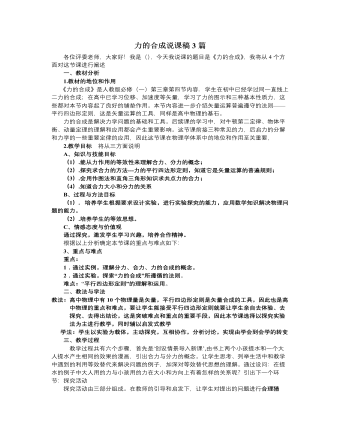
人教版新课标高中物理必修1力的合成说课稿3篇
① 实验设计将学生分组,利用桌上的器材进行探究(幻灯片展示)这个实验难度较大,为了降低难度,为实验探究铺下第二台阶,要求学生先分小组讨论以下问题(幻灯片展示)有些学生可能不知如何下手,我会要求学生先阅读课本中的实验描述从中得到一点提示,再让一两个小组同学回答,这样既体现了学生学习的主体性又可提高学生自主思考和语言表达能力,之后我再进行补充完善(幻灯片展示答案),并用幻灯片把实验步骤展示出来,在学生实验过程一直保留,使学生能朝正确的方向进行猜想和操作,为实验探究铺下第三个台阶。② 实施探究在学生分组进行探究过程,教师巡视解惑,随时观察学生情况,解答学生提出的问题,还可用自言自语方式提示应注意的一些问题,如仪器的正确使用,操作的规范等,帮助学生尽量在规定时间内顺利完成实验。
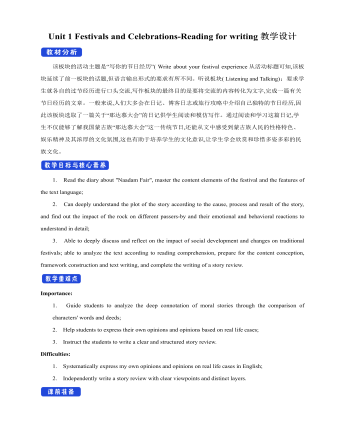
新人教版高中英语必修3Unit 1 Festivals and Celebrations-Reading for writing教学设计二
Step 3 Analyzing article structureActivity 31. Teachers raise questions to guide students to analyze the chapter structure of this diary and think about how to describe the festival experience. (1)What should be included in the opening/body/closing paragraph(s)?(2)How did the writer arrange his/her ideas?(3)What kind of interesting details did the writer describe?(4)How did the writer describe his/her feelings/emotions during the event?2. Students read and compare the three sentence patterns in activity 2. Try to rewrite the first paragraph of the diary with these three sentence patterns. After that, students exchange corrections with their partners. Such as:●This was my first time spending three days experiencing the Naadam Festival in China’s Inner Mongolia Autonomous Region and it was an enjoyable and exciting experience. ●I'll never forget my experience at the Naadam Festival because it was my first time to watch the exciting Mongolian games of horse racing, wrestling, and archery so closely. ●I'll always remember my first experience at the Naadam Festival in China’s Inner Mongolia Autonomous Region because it was so amazing to spend three days witnessing a grand Mongolian ceremony. Step 4 Accumulation of statementsActivity 41. Ask the students to read the diary again. Look for sentences that express feelings and emotions, especially those with the -ing form and the past participle. Such as:● …horse racing, wrestling, and archery, which are all so exciting to watch. ● some amazing performances● I was surprised to see…● I was a little worried about. . . ● feeling really tiredOther emotional statements:●I absolutely enjoyed the archery, too, but the horse races were my favourite part. ●I'm finally back home now, feeling really tired, but celebrating Naadam with my friend was totally worth it. ●He invited me back for the winter to stay in a traditional Mongolian tent and cat hot pot. I can’t wait!2. In addition to the use of the -ing form and the past participle, the teacher should guide the students in the appreciation of these statements, ask them to memorize them, and encourage them to use them reasonably in writing practice.
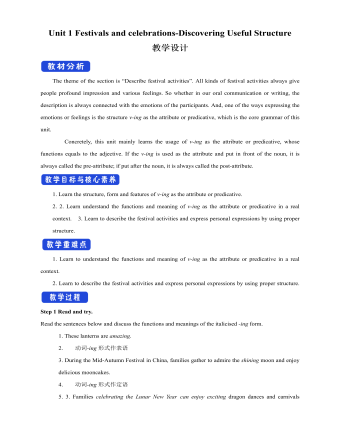
新人教版高中英语必修3Unit 1 Festivals and celebrations-Discovering Useful Structure教学设计
4.That was an experience that frightened everyone. →That was _____________________. 答案:1. taking 2. being discussed 3. in the reading room 4. a frightening experienceStep 6 The meaning and function of V-ing as the predicative动词-ing形式作表语,它通常位于系动词后面,用以说明主语“是什么”或“怎么样”一种表示主语的特质、特征和状态, 其作用相当于形容词; 另一种具体说明主语的内容, 即主语等同于表语, 两者可互换。The music they are playing sounds so exciting. 他们演奏的音乐听起来令人激动。The result is disappointing. 结果令人失望。Our job is playing all kinds of music. 我们的工作就是演奏各种音乐。Seeing is believing. 眼见为实。Step 7 Practice1. It is ________(amaze) that the boy is able to solve the problem so quickly.2. Buying a car is simply _______(waste) money. 3. Please stop making the noise—it’s getting ________(annoy). 4. complete the passage with the appropriate -ing form.La Tomatina is a festival that takes place in the Spanish town Bunol every August. I think many food festivals are __________ because people are just eating. however, this festival is _________ because people don't actually eat the tomatoes. Instead, they throw them at each other! the number of people ________ part in this tomato fight, can reach up to 20,000, and it is a very __________ fight that lasts for a whole hour. The _______ thing is how clean Bunol is after the tomatoes are washed away after the fight. this is because the juice form tomatoes is really good for making surfaces clean!答案:1. amazing 2. wasting 3. annoying4. boring interesting taking exciting amazing
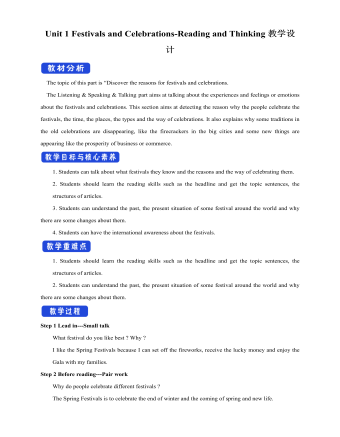
新人教版高中英语必修3Unit 1 Festivals and Celebrations-Reading and Thinking教学设计
The topic of this part is “Discover the reasons for festivals and celebrations.The Listening & Speaking & Talking part aims at talking about the experiences and feelings or emotions about the festivals and celebrations. This section aims at detecting the reason why the people celebrate the festivals, the time, the places, the types and the way of celebrations. It also explains why some traditions in the old celebrations are disappearing, like the firecrackers in the big cities and some new things are appearing like the prosperity of business or commerce. 1. Students can talk about what festivals they know and the reasons and the way of celebrating them.2. Students should learn the reading skills such as the headline and get the topic sentences, the structures of articles.3. Students can understand the past, the present situation of some festival around the world and why there are some changes about them. 4. Students can have the international awareness about the festivals.1. Students should learn the reading skills such as the headline and get the topic sentences, the structures of articles.2. Students can understand the past, the present situation of some festival around the world and why there are some changes about them.Step 1 Lead in---Small talkWhat festival do you like best ? Why ?I like the Spring Festivals because I can set off the fireworks, receive the lucky money and enjoy the Gala with my families.Step 2 Before reading---Pair workWhy do people celebrate different festivals ?The Spring Festivals is to celebrate the end of winter and the coming of spring and new life.The Mid-autumn Day is to celebrate the harvest and admire the moon.
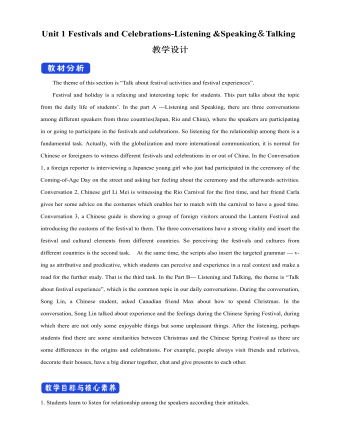
新人教版高中英语必修3Unit 1 Festivals and Celebrations-Listening &Speaking&Talking教学设计
The theme of this section is “Talk about festival activities and festival experiences”.Festival and holiday is a relaxing and interesting topic for students. This part talks about the topic from the daily life of students’. In the part A ---Listening and Speaking, there are three conversations among different speakers from three countries(Japan, Rio and China), where the speakers are participating in or going to participate in the festivals and celebrations. So listening for the relationship among them is a fundamental task. Actually, with the globalization and more international communication, it is normal for Chinese or foreigners to witness different festivals and celebrations in or out of China. In the Conversation 1, a foreign reporter is interviewing a Japanese young girl who just had participated in the ceremony of the Coming-of-Age Day on the street and asking her feeling about the ceremony and the afterwards activities. Conversation 2, Chinese girl Li Mei is witnessing the Rio Carnival for the first time, and her friend Carla gives her some advice on the costumes which enables her to match with the carnival to have a good time. Conversation 3, a Chinese guide is showing a group of foreign visitors around the Lantern Festival and introducing the customs of the festival to them. The three conversations have a strong vitality and insert the festival and cultural elements from different countries. So perceiving the festivals and cultures from different countries is the second task. At the same time, the scripts also insert the targeted grammar --- v-ing as attributive and predicative, which students can perceive and experience in a real context and make a road for the further study. That is the third task. In the Part B--- Listening and Talking, the theme is “Talk about festival experience”, which is the common topic in our daily conversations. During the conversation, Song Lin, a Chinese student, asked Canadian friend Max about how to spend Christmas. In the conversation, Song Lin talked about experience and the feelings during the Chinese Spring Festival, during which there are not only some enjoyable things but some unpleasant things. After the listening, perhaps students find there are some similarities between Christmas and the Chinese Spring Festival as there are some differences in the origins and celebrations. For example, people always visit friends and relatives, decorate their houses, have a big dinner together, chat and give presents to each other.
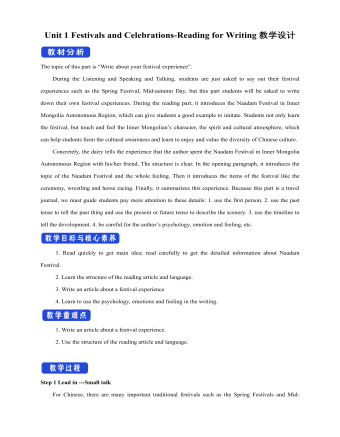
新人教版高中英语必修3Unit 1 Festivals and Celebrations-Reading for Writing教学设计一
The topic of this part is “Write about your festival experience”.During the Listening and Speaking and Talking, students are just asked to say out their festival experiences such as the Spring Festival, Mid-autumn Day, but this part students will be asked to write down their own festival experiences. During the reading part, it introduces the Naadam Festival in Inner Mongolia Autonomous Region, which can give students a good example to imitate. Students not only learn the festival, but touch and feel the Inner Mongolian’s character, the spirit and cultural atmosphere, which can help students form the cultural awareness and learn to enjoy and value the diversity of Chinese culture.Concretely, the dairy tells the experience that the author spent the Naadam Festival in Inner Mongolia Autonomous Region with his/her friend. The structure is clear. In the opening paragraph, it introduces the topic of the Naadam Festival and the whole feeling. Then it introduces the items of the festival like the ceremony, wrestling and horse racing. Finally, it summarizes this experience. Because this part is a travel journal, we must guide students pay more attention to these details: 1. use the first person. 2. use the past tense to tell the past thing and use the present or future tense to describe the scenery. 3. use the timeline to tell the development. 4. be careful for the author’s psychology, emotion and feeling, etc.1. Read quickly to get main idea; read carefully to get the detailed information about Naadam Festival.2. Learn the structure of the reading article and language.3. Write an article about a festival experience4. Learn to use the psychology, emotions and feeling in the writing.1. Write an article about a festival experience.2. Use the structure of the reading article and language.
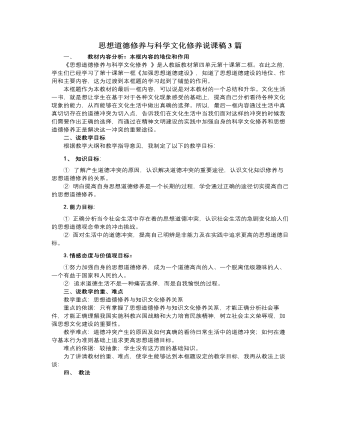
人教版高中政治必修3思想道德修养与科学文化修养说课稿3篇
(3)改造主观世界同改造客观世界的关系。改造客观世界同改造主观世界,是相互联系、相互作用的。改造主观世界是为了更好地改造客观世界,人们在改造客观世界的同时也改造着自己的主观世界。通过自觉改造主观世界,又能提高改造客观世界的能力。师:人们对自己的思想道德境界的追求,是永远止境的。让我们共同努力,在践行社会主义思想道德的过程中,不断追求更高的目标,像无数先辈那样,加入到为共产主义远大理想而奋斗的行列中吧!课堂小结通过本节课学习使我们认识到面对现实生活中的思想道德冲突,加强知识文化修养和思想道德修养,不断追求更高的思想道德目标的必要性;把握了知识文化修养与思想道德修养的含义及其相互关系;明确了我们应该和怎样追求更高的思想道德目标;认识到这是一个永无止境的过程。我们要脚踏实地,从现在做起、从点滴小事做起,不断提高知识文化修养和思想道德修养,追求更高的思想道德目标。
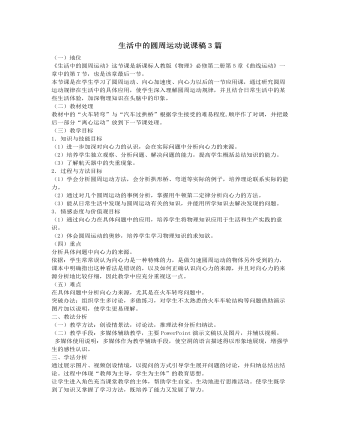
人教版新课标高中物理必修2生活中的圆周运动说课稿3篇
(一)地位《生活中的圆周运动》这节课是新课标人教版《物理》必修第二册第5章《曲线运动》一章中的第7节,也是该章最后一节。本节课是在学生学习了圆周运动、向心加速度、向心力以后的一节应用课,通过研究圆周运动规律在生活中的具体应用,使学生深入理解圆周运动规律,并且结合日常生活中的某些生活体验,加深物理知识在头脑中的印象。(二)教材处理教材中的“火车转弯”与“汽车过拱桥”根据学生接受的难易程度,顺序作了对调,并把最后一部分“离心运动”放到下一节课处理。(三)教学目标1.知识与技能目标(1)进一步加深对向心力的认识,会在实际问题中分析向心力的来源。(2)培养学生独立观察、分析问题、解决问题的能力,提高学生概括总结知识的能力。(3)了解航天器中的失重现象。2.过程与方法目标(1)学会分析圆周运动方法,会分析拱形桥、弯道等实际的例子,培养理论联系实际的能力。
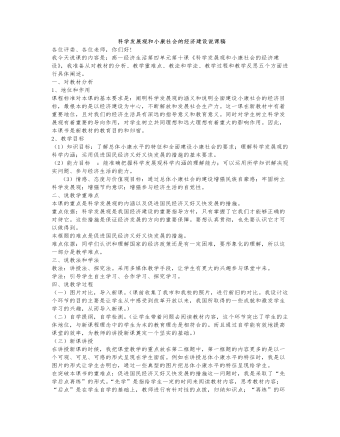
人教版高中政治必修1科学发展观和小康社会的经济建设说课稿
一、对教材分析1、地位和作用课程标准对本课的基本要求是:阐明科学发展观的涵义和说明全面建设小康社会的经济目标,最根本的是以经济建设为中心,不断解放和发展社会生产力。这一课在新教材中有着重要地位,且对我们的经济生活具有深远的指导意义和教育意义。同时对学生树立科学发展观有着重要的导向作用,对学生树立共同理想和远大理想有着重大的影响作用。因此,本课书是新教材的教育目的和归宿。2、教学目标(1)知识目标:了解总体小康水平的特征和全面建设小康社会的要求;理解科学发展观的科学内涵;运用促进国民经济又好又快发展的措施的基本要求。(2)能力目标 :能准确把握科学发展观科学内涵的理解能力;可以运用所学知识解决现实问题、参与经济生活的能力。(3)情感、态度与价值观目标:通过总体小康社会的建设增强民族自豪感;牢固树立科学发展观;增强节约意识;增强参与经济生活的自觉性。
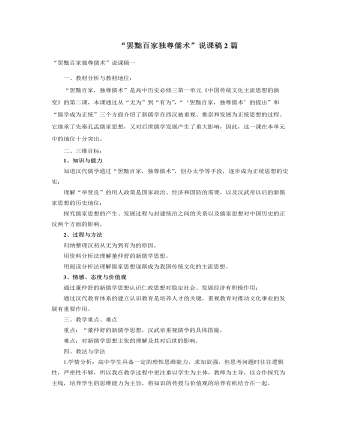
人教版高中历史必修3“罢黜百家独尊儒术”说课稿2篇
1、汉武帝尊儒的措施:(1)政治方面:起用很多儒学家参与国家大政。他规定,地方定期选出孝子、廉吏当中央任官,甚至还擢升平民、儒士为相。这明显扩大了官员的队伍,提高了官员的文化素质,巩固了封建统治基础,成为汉武帝文治武功的重要组成部分。也给后世封建王朝在用人方式方法上面提供了宝贵的借鉴和启迪。(2)思想方面:采纳董仲舒的建议,“罢黜百家 独尊儒术”(3)教育方面:儒家经典“五经”为国家规定的教科书。兴办太学和设立地方学校进行儒学教育。公元前136年,汉武帝正式规定《诗》、《书》、《礼》、《易》、《春秋》为“五经”;前124年,又在长安兴办太学,规定太学生员为博士弟子,一律由儒家五经博士负责教授,学完经考试合格后即可到政府任官。这是封建国家利用政权的力量兴办教育、提倡儒学,其必然对整个社会的教育事业有一定的导向作用。
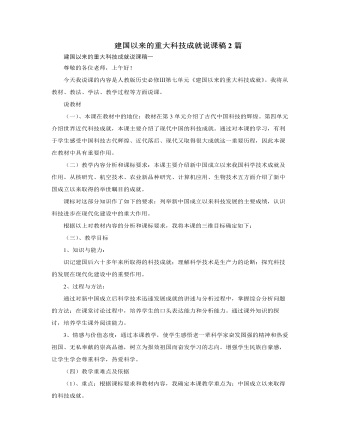
人教版高中历史必修3建国以来的重大科技成就说课稿2篇
说教材(一)、本课在教材中的地位:教材在第3单元介绍了古代中国科技的辉煌。第四单元介绍世界近代科技成就,本课主要介绍了现代中国的科技成就。通过对本课的学习,有利于学生感受中国科技古代辉煌、近代落后、现代又取得很大成就这一重要历程,因此本课在教材中具有重要作用。(二)教学内容分析和课标要求:本课主要介绍新中国成立以来我国科学技术成就及作用。从核研究、航空技术、农业新品种研究、计算机应用、生物技术五方面介绍了新中国成立以来取得的举世瞩目的成就。课标对这部分知识作了如下的要求:列举新中国成立以来科技发展的主要成绩,认识科技进步在现代化建设中的重大作用。根据以上对教材内容的分析和课标要求,我将本课的三维目标确定如下:(三)、教学目标1、知识与能力:识记建国后六十多年来所取得的科技成就;理解科学技术是生产力的论断;探究科技的发展在现代化建设中的重要作用。
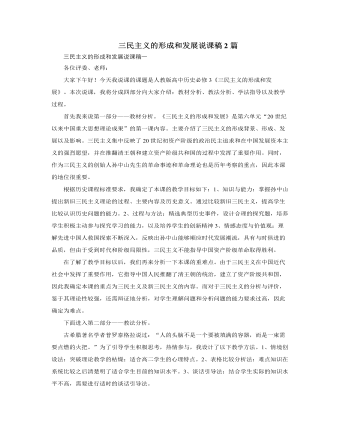
人教版高中历史必修3三民主义的形成和发展说课稿2篇
在学生正确掌握了三民主义的进步性和局限性之后,提出第五个问题:三民主义的局限性是由什么决定的?这一问题学生较易回答,为进入下一目教学打下基础。二、三民主义的实践这目内容在新课导入时已经涉及,故进行略讲,主要采用谈话法,与学生一起回忆、交流。在此基础上,提出探究问题五:在三民主义指导下,孙中山先生进行的一系列革命斗争其结局怎样?为什么会这样?第一问学生较易回答,第二问我组织学生进行交流、讨论。在学生回答的基础上,我将向学生指出:由于三民主义的局限性,它不能指导中国民主革命走向成功,中国革命呼唤新的理论指导。从而过渡到下一目教学。三、旧三民主义发展为新三民主义1、背景:情境再现,激发兴趣分析资料,感悟新知多媒体播放电影《孙中山》片段让学生感受在一系列革命斗争失败后,孙中山先生的彷徨、思索。
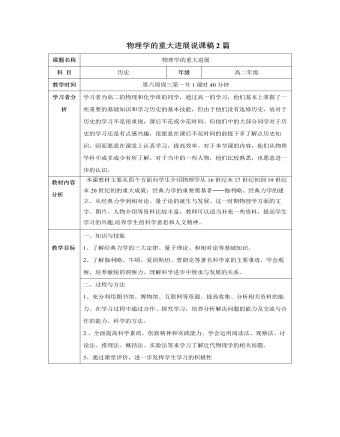
人教版高中历史必修3物理学的重大进展说课稿2篇
二、相对论的创立【课件】展示下列材料艾伯特·爱因斯坦(1879——1955),1879年3月14日诞生在德国乌尔姆的一个犹太人家中。1894年举家迁居意大利米兰。1900年毕业于瑞士苏黎世工业大学。爱因斯坦被认为是最富于创造力的科学家,他不但创立了相对论,还提出了光量子的概念,得出了光电效应的基本定律,并揭示了光的波粒二重性本质,为量子力学的建立奠定基础。为此荣获1921年度的诺贝尔物理学奖。同时,他还证明了热的分子运动论,提出了测定分子大小的新方法。【问题】19世纪末20世纪初爱因斯坦对物理学的贡献是什么?意义是什么?为什么会出现?1、背景:经典物理学的危机。19世纪末三大发现:x射线、放射性和电子,经典力学无法解释研究中的新问题,如:黑体辐射、光电效应等。2、相对论的提出及主要内容:(1)“狭义相对论”和光速不变原理:1905年提出。
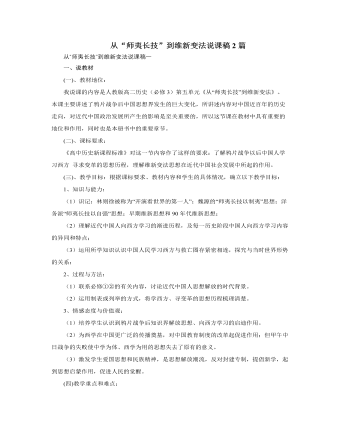
人教版高中历史必修3从“师夷长技”到维新变法说课稿2篇
(一)、教材地位:我说课的内容是人教版高二历史(必修3)第五单元《从“师夷长技”到维新变法》。本课主要讲述了鸦片战争后中国思想界发生的巨大变化,所讲述内容对中国近百年的历史走向,对近代中国政治发展所产生的影响是至关重要的,所以这节课在教材中具有重要的地位和作用,同时也是本册书中的重要章节。(二)、课标要求:《高中历史新课程标准》对这一节内容作了这样的要求:了解鸦片战争以后中国人学习西方 寻求变革的思想历程,理解维新变法思想在近代中国社会发展中所起的作用。(三)、教学目标:根据课标要求、教材内容和学生的具体情况,确立以下教学目标:1、知识与能力:(1)识记:林则徐被称为“开演看世界的第一人”;魏源的“师夷长技以制夷”思想;洋务派“师夷长技以自强”思想;早期维新思想和90年代维新思想;
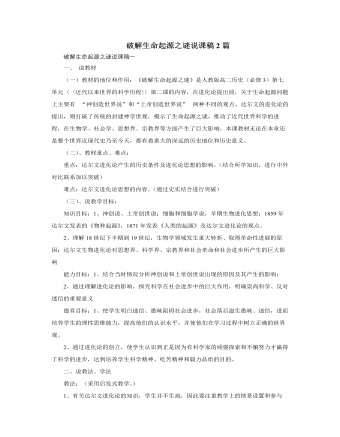
人教版高中历史必修3破解生命起源之谜说课稿2篇
过度:诚如牛顿所说 我之所以能够取得今天的成就有很大原因是站在巨人的肩膀之上设问3:为什么这个时代选择了达尔文来完成这一伟大的发现呢?(达尔文的个人努力)补充材料:(1831年起,他随“贝格尔号”考察舰进行环球考察5年。考察结束后,在整理考察资料和实物标本的基础上,经过长期的研究,于1859年出版了《物种起源》一书,确立了生物的进化论说明达尔文的个人努力:学习、考察、学习、不迷信权威、勇于挑战、不断探索的精神,饱览群书,挑战和假设建立在大量的阅读和观察的基础上,科学实证等等。可以说达尔文身上有那个时代的一个浓缩的特征,当然他还有点运气,不过,机遇永远是为那些有准备的人提供的。)探究:达尔文“进化论”的影响思路引领:科学理论发展的影响可以从哪些方面分析?(经济、科学理论本身、人文学科、社会影响(对宗教,社会),对其他国家的影响)设问:达尔文进化论对1859年及以后的社会带来了非常深远的影响。有哪些影响呢?①挑战封建神学的神创世,促进人类认识的飞跃
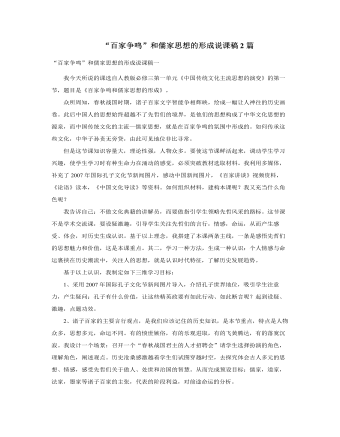
人教版高中历史必修3“百家争鸣”和儒家思想的形成说课稿2篇
我们知道事物之间的矛盾会发生转化。但是,由于老子看不到转化的条件,更看不到人的主观能动性,因此他对人类社会的发展抱着消极悲观的态度,幻想回到“鸡犬之声相闻,老死不相往来”的“小国寡民”的社会。他的思想,通过《老子》一书留传了下来。后来的庄子继承了老子的思想,把“道”作为世界最高的原则,我们可以来看发生在庄子身上的一个故事:庄子在妻子死后,居然鼓盆而歌,朋友惠施去探望时责备他,他讲出一番道理:“当我妻子刚死的时候,我怎么会不难过?可是我省思之后,觉察到她不但没有生命,而且没有形体;不但没有形体,也没有气,然后在恍恍惚惚的情况下,变出了气,气再变化而出现形体,形体再变化而出现生命,现在又变化而回到死亡,这就好像春夏秋冬四季的运行一样。这个人已经安静地睡在天地的大屋里,而我还跟在一旁哭哭啼啼。我以为这样是不明白生命的道理,所以才停止哭泣啊!”
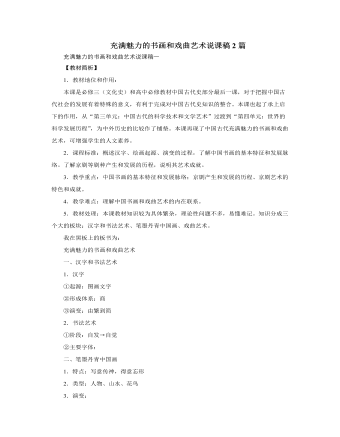
人教版高中历史必修3充满魅力的书画和戏曲艺术说课稿2篇
师:很好!我们知道,元明清时期,我国封建社会进入衰落时期,封建专制不断加强,对文人的思想控制也在不断加强,士大夫文人只有通过画来表达自己的想法和内心世界,所以这时候的画强调借物抒情。大家可以再看到这幅清朝郑板桥《墨竹图》,竹子非常清新俊逸,抒发了一个清高的文人情怀。大家可以仔细品味,郑板桥的竹子有种脱俗的感觉,看后让人非常静心。同学们,在欣赏国画的时候,我们不是一味地去看它像不像,而要更多去体会他的精神与气质,没有思想与内涵的人是画不出一副好画的,就算他画技再好,他的也是没有灵魂的。中国的水墨画,虽然没有涂颜料,它却会使你感受到春天的绿,秋天的黄和冬天的白,我们可以在画中找寻到自己精神的共鸣。好,刚刚讲了这么多,现在请一位同学看到这表格来归纳一下每个时期国画的不同特点。
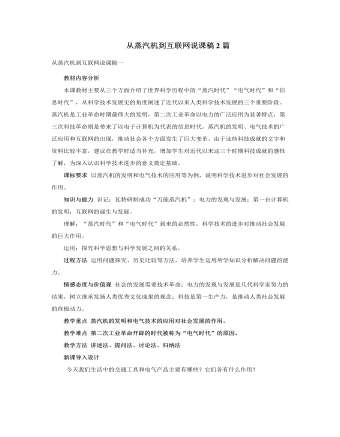
人教版高中历史必修3从蒸汽机到互联网说课稿2篇
2、互联网的功用:(1)功用:提供文件传输、电子信箱、聊天等服务,在社会各个领域发挥了巨大的作用,标志着信息化社会的出现。(2)特点:网络媒体作为一种新的传播媒体,具有界面直观、音色兼备、链接灵活和高速传输的特点。3、互联网的影响:教师提问,学生思考回答,教师总结 (1)信息经济在世界各地全面发展,加快了经济全球化的步伐;(2)传统产业也借助互联网提高管理水平,并通过全球营销和采购扩大市场;(3)在互联网时代,人们可以在家里完成很多工作,提高了工作效率,增加了乐趣;(4)人们的社会交往方式也发生着改变。(5)也带来一些负面影响。【合作探究】3:青少年如何对待网络:互联网在给社会带来巨大效能的同时,也带来了巨大的挑战。青少年应该提高自身的道德素养,树立正确的网络观,让网络发挥出应有的作用。





















